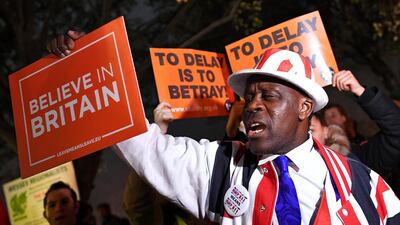Theresa May defeated an attempt by MPs to take control of Brexit negotiations on Thursday as parliament backed a move to delay leaving the EU.
The embattled Prime Minister will make a third attempt to push through the exit agreement she negotiated with the EU next week, allowing for a later departure, possibly as early as May. However if her deal cannot pass after three defeats in Parliament a much longer delay is likely.
If the deal is rejected next week, MPs will be given the chance to shape the way any further Brexit negotiations will go through a number of indicative votes that would allow parliament to "consider potential ways forward".
Mrs May warned there could be extensive delays to Brexit if her deal is not accepted. There are widespread fears that any extension would force the UK to prepare for European elections in late May. Her de-facto deputy said it was never the government’s plan to push back Britain’s exit from the EU.
On Thursday EU Council leader Donald Tusk said he would appeal for the EU’s other 27 countries “to be open to a long extension if the UK finds it necessary to rethink its Brexit strategy and build consensus around it”. Any Brexit delay has to unanimously be agreed by EU member states.
Mrs May is set to fly to Brussels next week for, theoretically, her last EU summit, where she will ask for an extension.
Labour’s shadow Brexit secretary said bringing back the deal for a third vote “is an act of desperation”. Sir Keir Starmer warned of further divisions within Mrs May’s party by making the “absurd and irresponsible” move.
On Wednesday MPs voted to take a no-deal Brexit off the table, but Mrs May suffered huge embarrassment when some of her ministers defied the party line. Eighteen ministers rebelled after opposing the government’s line, including four members of the cabinet.
The Prime Minister is banking on the support of hardcore Brexiteers from her Conservative Party supporting her deal next week, who fear a shrinking of options that could leave Britain’s future relationship with the EU closer than they desired. Many refused to back her deal on when it was rejected for the second time on Tuesday.
Northern Ireland’s Democratic Unionist Party, which has 10 MPs, were said to be in discussions with the government to see if they could be enticed to support the government’s proposed EU exit plan in the future.
Both Brexiteers and the DUP are deeply concerned that the controversial Irish backstop, the insurance mechanism against a hard border on the island of Ireland, could keep Britain and the EU connected indefinitely.
There was uproar in the House of Commons when speaker John Bercow chose an amendment calling for a second Brexit referendum for discussion but ignored an opposing one.
Labour announced on Thursday it would not support a vote for a second referendum on Thursday despite calls for it to do so, which draw criticism from some MPs. Mr Starmer said it was the wrong day to discuss the issue as did the People’s Vote campaign group.
"A shiver has run along the front bench of the Labour Party looking for a spine to crawl up - and it hasn’t been able to find one," said Ian Blackford, Westminster leader of the Scottish National Party.
US President Donald Trump waded into the issue, saying he was “surprised at how badly it’s all gone from the standpoints of a negotiation”. Speaking to reporters as he held talks with Irish leader Leo Varadkar, Mr Trump said if Mrs May had listen to negotiation ideas the government “would have been successful”.
“She didn’t listen to that and that’s fine - she’s got to do what she’s got to do. I think it could have been negotiated in a different manner, frankly. I hate to see everything being ripped apart now,” he said.”


